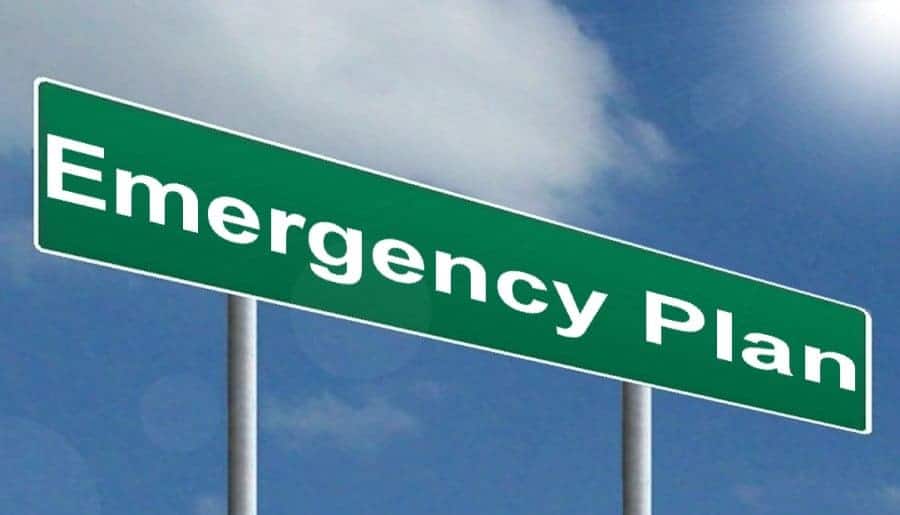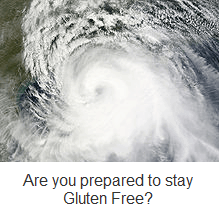new to the gluten free journey?
new to the gluten free journey?

Contents
ToggleAre you prepared to stay gluten free during an emergency? Do you have your gluten free survival food stocked? Do you have a contingency plan if the power goes out, if a snow storm or hurricane strikes, or if food shortages occur?
The reality of a natural disaster or emergency situation is very real. I have personally been through three major events in the last several years, and I can vouch from experience that being prepared ahead of time helped keep my family and I healthy and free of gluten induced damage.
In 2021, a major freeze hit Texas. In the south, we don’t have the infrastructure in place to deal with major freezing temperatures because cold weather is a rarity down here. This freeze knocked out the electrical grid throughout the state, and millions were left without power. Typically, this would have been a small inconvenience, but because the temperature dropped to below freezing, many people had their water pipes burst from the freezing water expansion. Leading to flooding of homes. The only solution was to turn off the water to the home. The roads were not drivable due to icy conditions. Stores were closed, and the people were left to their own devices. The situation went on for several weeks. For many, no power or water in below freezing temperatures with water damage in the home. How do you cook without power or water?
Fortunately we were prepared. One of the first things I did after living without power for two weeks in 2008 (after a hurricane) was buy a generator. Because of this, we never lost power or water…and because I am a big believer in having an emergency food storage, we didn’t have to go without eating or compromise our diet.
Keep in mind, most homes don’t have enough non perishable food to last more than a week. During this event, there was a major food shortage due to supply chain issues caused by the freeze. Bottom line – those who were unprepared, were caught off guard.
Several years ago, I was in San Diego, CA. for a lecture. During the trip, the power went out in the entire southern half of the state. No one knew why. Cell phones were useless. I was disconnected from the internet, and a transient Dark Ages set in.
I was staying at a hotel in the downtown district, and people quickly went into panic mode. The streets
filled with people looking to find food. Restaurants ran out of food within hours. When the darkness of night set in, it got worse. Imagine being surrounded by that many people in closed quarters. The food was gone, communications with the outside world were cut off, and there were no lights, air conditioning, or refrigeration.
The people were stressed, they were hot and sweating. The smell of body odor permeated through the hotel lobby. The tension and fear were palpable. The hotel I stayed in was actually serving candy and processed cheese. That’s all they had left to serve. People were grabbing and gobbling it up. Not me…
Luckily, I was prepared. I always travel with food rations. Beef jerky, canned fish, grain free granola, and nuts can go a long way in a tight spot. Fortunately the power was only out for a day. But what if the power had not come back on? Would you be prepared to make it? Would you be able to stay calm and gluten free?
 Hurricane Ike
Hurricane IkeHurricane Ike struck Houston in the Summer of 2008. If you aren’t familiar with Houston, it is HOT in the Summer. Temperatures range in the upper 90’s to 110 degrees. The humidity can be stifling. The air is heavy, and when you sweat, it sticks on your skin offering very little cooling relief. When Ike hit our coastline, the power was the first thing to go. That means no AC. That means your fridge and freezer start to heat up quick. The gas pumps running on electricity are inoperable. No TV, no computers, no ability to charge your electronic devices, no cooking with microwaves or electric stoves.
The morning after the hurricane blew through, the grocery store shelves were empty. Many of them stayed closed for days due to the power outage. People were acting erratic. They were scared. I was at home with my three sons. Fortunately my wife was out of town visiting her parents so she didn’t have to go through the first wave.
FEMA trucks were delivering ice if you cared to wait in line for hours to get it. Bottom line, if you weren’t prepared, your gluten free diet would be in jeopardy, and so would your health.
Depending on your geographic location, you may have to contend with hurricanes, earthquakes, winter storms, power outages, tornadoes, floods, tsunamis, volcanic eruptions, etc. Now I don’t say all of this to be a fear monger. I say it because it could happen to you (maybe it already has). I say it to get you thinking about preparedness. Most of the things below are common sense. That being said, knowing what you should do and actually doing it are two different things. Hopefully this list of considerations and action items will give you a reminder to prepare appropriately.
Failing to plan is planning to fail.
…and
Chance favors the prepared.
are two mantras to live by when mapping out what you need to do.
There are many factors to consider when planning for your gluten free emergency. Food is only one of them. You need to consider other things as well. Back up power and electricity options, cooking alternatives, water storage, communications, home protection, and connecting with other prepared individuals in your community should all be a part of your contingency plan. Don’t forget that emergencies are not something we can accurately predict, so planning for the absolute worst should also be part of your mindset. Consider that you might need other tools that could prove to be invaluable should the emergency last longer than anticipated.
I am not a big fan of the dehydrated powder foods that claim to have a 25 year shelf life. First of all, the vast majority of these products are not organic. Many of them are loaded with MSG and other preservatives. They typically contain a lot of grains like wheat, corn, oats, and rice. If you are trying to stay gluten free, the vast majority of these products won’t work for you.
If you are working with a restricted budget or storage space, make sure to stock up on foods that are higher in protein and fat as they will literally give you and your family better gas mileage. Remember that the average person weighing 150 lbs. needs about 1500-2000 Calories daily to function at high capacity. So consider your family’s needs as a whole. Also consider that buying foods that your family already eats is ideal. That way, you can eat through your stock and replenish it as you do instead of storing highly processed dehydrated powder food cannisters that will most likely never be eaten. The following list is not exhaustive, but should help get you moving in the right direction.
Don’t forget that emergency water rations are also important to consider. A natural disaster could damage the pipes or compromise the water supply, subjecting people to risk of exposure to toxins and disease causing micro organisms. If get your water from a well, a loss of power can render your well pump useless. Therefore having a plan for keeping enough water could make or break your success. I recommend a few key resources to help you with this:
If the power goes out, you will want to consider a number of the items listed below. Keep in mind that electronic payments will not be available if there is no power, so you will have to have cash on hand to make any purchases.
If there is a prolonged disaster or emergency that inhibits life as we are accustomed, you might also consider having some of the following items on hand for health and medical needs. (The video below has more detailed information on these items as well).
Take the time to prepare today. Remember that just like an ounce of prevention = a pound of cure, an ounce of preparedness = a pound making life a whole lot easier.
If you have tips to add or resources for any of the above, please feel free to share with us below…
Always looking out for you,
Dr. Osborne – The Gluten Free Warrior
Written and medically reviewed by Dr. Peter Osborne. Updated on November 18, 2021
10 Responses
Dr. Osborne, I was at home in La Jolla, CA when that happened, and it was scary! My number one concern when that happened was not the food, but the water! The Glacier water machines were immediately out of order, and police were notifying us that the tap water needed to be boiled before drinking. Since no one could get fuel either, I was concerned that I only had a quarter tank of gas in my car. Luckily, I was prepared for 48 hours and the power came back on after about 12 hours. However, the event really put preparedness into perspective! At the time, no one knew if the power was just out in San Diego or if it was the entire region or perhaps the entire country.
Dr. Osborne,
This is a great article!!
I live in earthquake/fire country and while trying to prepare an emergency food supply discovered the nutrient dense Medjool date. Medjools are loaded with minerals, vitamins, fiber, and 23 types of amino acids! In a crisis we will all need a little carbohydrate to keep the faith!
Research these (jewels) on-line for amazing information. You can buy them organic in many different sizes. Filled with micro nutrients medjools form of sugar (frutose/glucose) will blend nicely with nuts. (Muslims also use them to break their fast during Ramadan.) They keep beautifully in the freezer for a year. Waiting for the new harvest of dates in September. I’ll be stocking up!
Hey Mindy,
I love these dates. My wife makes a paste with them to sweeten in recipes.
Thanks for the tip on Medjool dates! I usually just eat them…oink, oink. But its nice to know they can be frozen. Costco sells a 2lb box for eight or nine dollars. I’ll be stocking up, too since The Farmer’s Almanac forecasts a much colder winter than normal for 2013-2014.
Thank you, Dr. O for this inspiring article! If I had been from the Asia I guess I would go and buy a big sack of Rice. The Italian would keep olive Oil in large cans as well as tomsto, online and spices Besides dried Meat and Canned fish I would have a book on weed food to eat like dandilion.
As to water one can buy Life Straw at Amazon that Will convert any water to become drinkable,
Thank you Dr.O for reminding us!
so, what happens to the food when there is no electricity and the Freezer is on strike?
hence solar backup to keep some of needed appliances running intermittently
Dear Dr. Osborne,
The water storage tanks you provided a link for came with chlorine drops to add to the water, saying that then it will be good for five years. The bottles say “chlorine dioxide” and “phosphoric acid activator”. Is this a good idea? I’ve noted on our city’s website that our tap water has chlorine added to it.
Thank you.
When you are storing emergency water, it is important to add chlorine to prevent bacterial contamination of it.
What about canning water? If you use water that is already filtered and can it, won’t that keep it sterile to drink?